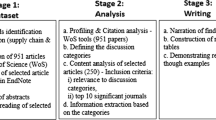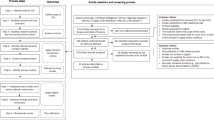Abstract
The purpose of this study is to investigate the possibility of applying some of the most widely known mathematical theories of war in the case of firms. In this research, Frederick William Lanchester’s combat models, that seemed to be particularly useful to the U.S. Army at the Pacific campaign against the Japanese fleet during World War II, were examined. These mathematical models were based on differential equations and their main purpose was to predict the outcome of battles. After the appropriate theoretical assumptions were set, the examined models were applied to the case of Coca-Cola™ and Pepsi™ supply chains in the Greek market. These models have been applied to these firms by other researchers too. The results of the implementations have led to the conclusion that the theoretical models are almost identical to the reality, which means that they are applicable in business under the right conditions.




Similar content being viewed by others
References
Bracken J (1995) Lanchester models of the Ardennes campaign. Naval Res Logist 42(4):559–577
Chalikias M, Skordoulis M (2014) Implementation of Richardson’s arms race model in advertising expenditure of two competitive firms. Appl Math Sci 8(81):4013–4023
Cheema C (2005) Operations research. Laxmi Firewall Media Publications, New Delhi
Chintagunta P, Vilcassim N (1992) An empirical investigation of advertising strategies in a dynamic duopoly. Manag Sci 38(9):1230–1244
Daras N (2001) Differential equations and mathematical theories of war, vol II. Evelpidon Military Academy, Athens (in Greek)
Erickson G (1992) Empirical analysis of closed-loop duopoly advertising strategies. Manag Sci 38(12):1732–1749
Fehlmann T (2000) Measuring competitiveness in service design; decisions based on customer’s needs. In: Proceedings of the 12th Symposium on QFD, June 2000, QFD Institute
Fehlmann T (2008) New Lanchester theory for requirements prioritization. In: Proceedings of the second international workshop on software product management, Barcelona, September 2008, Bacelona: IEEE, pp 35–40
Fruchter G, Kalish S (1997) Closed-loop advertising strategies in a duopoly. Manag Sci 43(1):54–63
ICAP (2008) Sector study: juices-soft drinks. ICAP, Athens (in Greek)
Lanchester FW (1956) Mathematics in warfare. World Math 4:2138–2157
McKay N (2006) Lanchester combat models. Math Today 42:170–178
Oudrhiri R (2005) Six sigma and DFSS for IT and software engineering. Q J TickIT Softw Qual Certif Scheme 4:7–9
Ricardo H (1948) Frederick William Lanchester. Obit Not Fellows R Soc 5(16):756–766
Taoka N (1997) Lanchester strategy: an introduction. Lanchester Press, London
Wang Q, Wu Z (2001) A duopolistic model of dynamic competitive advertising. Eur J Oper Res 128(1):213–226
Author information
Authors and Affiliations
Corresponding author
Rights and permissions
About this article
Cite this article
Chalikias, M., Skordoulis, M. Implementation of F.W. Lanchester’s combat model in a supply chain in duopoly: the case of Coca-Cola and Pepsi in Greece. Oper Res Int J 17, 737–745 (2017). https://doi.org/10.1007/s12351-016-0226-0
Received:
Revised:
Accepted:
Published:
Issue Date:
DOI: https://doi.org/10.1007/s12351-016-0226-0
Keywords
- Operations research
- Frederick William Lanchester
- Mathematical theories of war
- Differential equations
- Supply chain
- Duopoly




